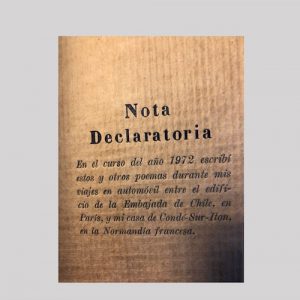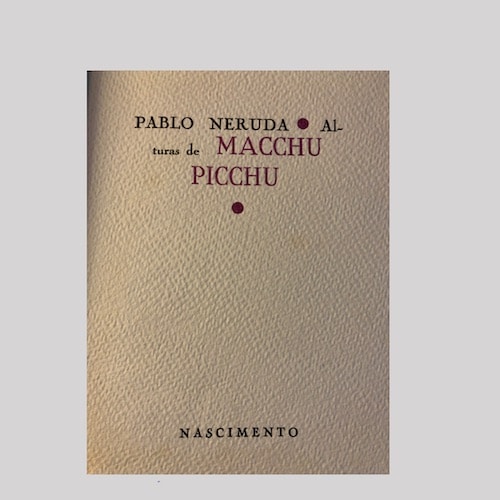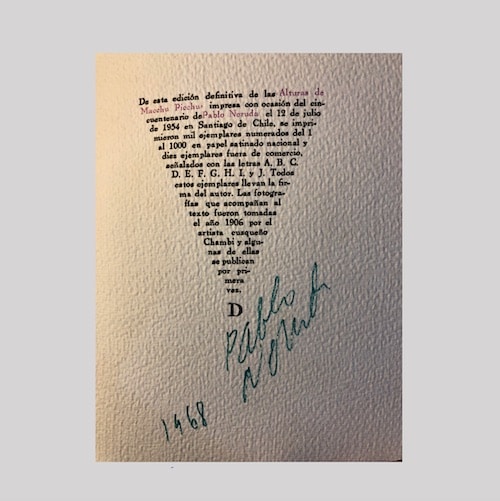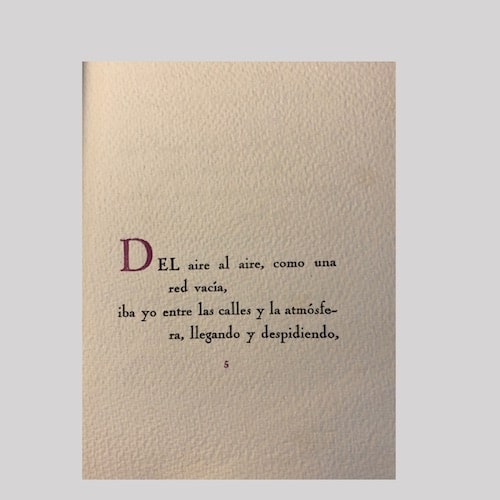Vídeo subtitulado en español e italiano
In 1998, I received a telephone call from a person who knew about my bibliographic hobbies and about my interest for first editions of Pablo Neruda’s work. He told me he had a book that he thought might interest me because it was signed by Neruda and because in the colophon, it was established that the edition consisted of only 10 copies.
This person took it to my office and as soon as I saw it, I knew I would buy that copy. It was a book entitled Two Poems, of which I had no reference whatsoever.
I acquired the aforementioned book and, as soon as I could, I went to the Neruda Foundation to request information on those “Two Poems”. Talking to Tamara Waldspurger I learned the story that I comment on below.
The penultimate work of Pablo Neruda, published during the poet’s lifetime, was “Four Poems Written in France”. This work, as its name implies, consists of four poems, namely: The Ocean is Calling; Homer Arrived; The Bell Tower of Authenay and The Skin of the Birch.
As Neruda himself says in a “declaratory note” at the end of the book, these and other poems were written in 1972, during his car trips between the Chilean Embassy building and his house in Condé-Sur-Iton, in French Normandy.
The colophon of this work says verbatim:
“This work consists of 300 numbered copies, the first 100 from I to C, printed on special feather paper with a fantasy paper cover, plus 200 copies numbered from 101 to 300 on special feather paper with a printed cardboard cover. All copies bear the signature of the author. The printing was made in the workshops of Editorial Nascimento and finished on December 31, 1972 “
When this book was published, one of the printing workers took the first and the fourth of the aforementioned poems and, without the authorization or knowledge of the author, proceeded to print a book that he called “Two Poems.” This book consists of twenty-four unnumbered pages, where only the odd or right-hand pages are used, and has the same typeface and layout and the same printing date as the book “Four Poems Written in France”.
The colophon of this work says verbatim:
“This work consists of 300 numbered copies, the first 100 from I to C, printed on special feather paper with a fantasy paper cover, plus 200 copies numbered from 101 to 300 on special feather paper with a printed cardboard cover. All copies bear the signature of the author. The printing was made in the workshops of Editorial Nascimento and finished on December 31, 1972 “
When this book was published, one of the printing workers took the first and the fourth of the aforementioned poems and, without the authorization or knowledge of the author, proceeded to print a book that he called “Two Poems.” This book consists of twenty-four unnumbered pages, where only the odd or right-hand pages are used, and has the same typeface and layout and the same printing date as the book “Four Poems Written in France”.
The culmination of this little-known book goes like this:
“Esta edición consta de 10 ejemplares, impresos en cartón prensado, numerados de la letra A a la J y firmados por el autor. La impresión fue hecha en los talleres de la Editorial Nascimento y terminada el 31 de diciembre de 1972”
El operario que hizo estos 10 ejemplares fue un día a Isla Negra y le presentó a Pablo Neruda el resultado de “su atrevimiento”. Dicen que al poeta no le pareció bien el proceder de este operario pero que, finalmente, se rindió ante esta osadía y firmó los diez ejemplares que le presentó el personaje en cuestión.
No se sabe si Neruda se quedó con algún o algunos de estos ejemplares, aunque lo más probable es que así fuera, ni quienes puedan ser – actualmente – los poseedores o dueños de los restantes. El ejemplar de “Dos poemas” que cayó en mis manos es el Ejemplar letra J de esta particular y poco conocida edición.
Cabe hacer mención que “Dos poemas” no aparece mencionado en la bibliografía de Neruda hecha por Horacio J. Becco, la que incluyó “Cuatro poemas escritos en Francia”. En las Obras Completas editadas por Hernán Loyola no se menciona la obra “Cuatro poemas escritos en Francia” y, por lo tanto, tampoco se hace mención a “Dos poemas”.
Note:
It is also worth mentioning that of the poems in the book “Four Poems Written in France”, only the one entitled “The Bell Tower of Authenay” was published before the aforementioned book. Indeed, it appears in “Unfruitful Geography”, a book published in Buenos Aires by Editorial Losada, printed in May 1972.
The poems “The Skin of the Birch” and “Flame the Ocean” were included in the work “Winter Garden”, published in Buenos Aires by Editorial Losada, printed on January 8, 1974.
Finally, the poem “Homer Arrived” was included in the book “Chosen Defects”, also published in Buenos Aires by Editorial Losada and was printed on July 28, 1974.
Video subtitled in Spanish and Italian

Ignacio Swett is a Civil Engineer and is currently a member of the Board of Directors of a steel company and of the Puente Foundation, which aims to help vulnerable young people. As a bibliophile, he is a recognized collector of first editions of Chilean history, of Gabriela Mistral (Nobel Prize in Literature 1945) and Pablo Neruda.








